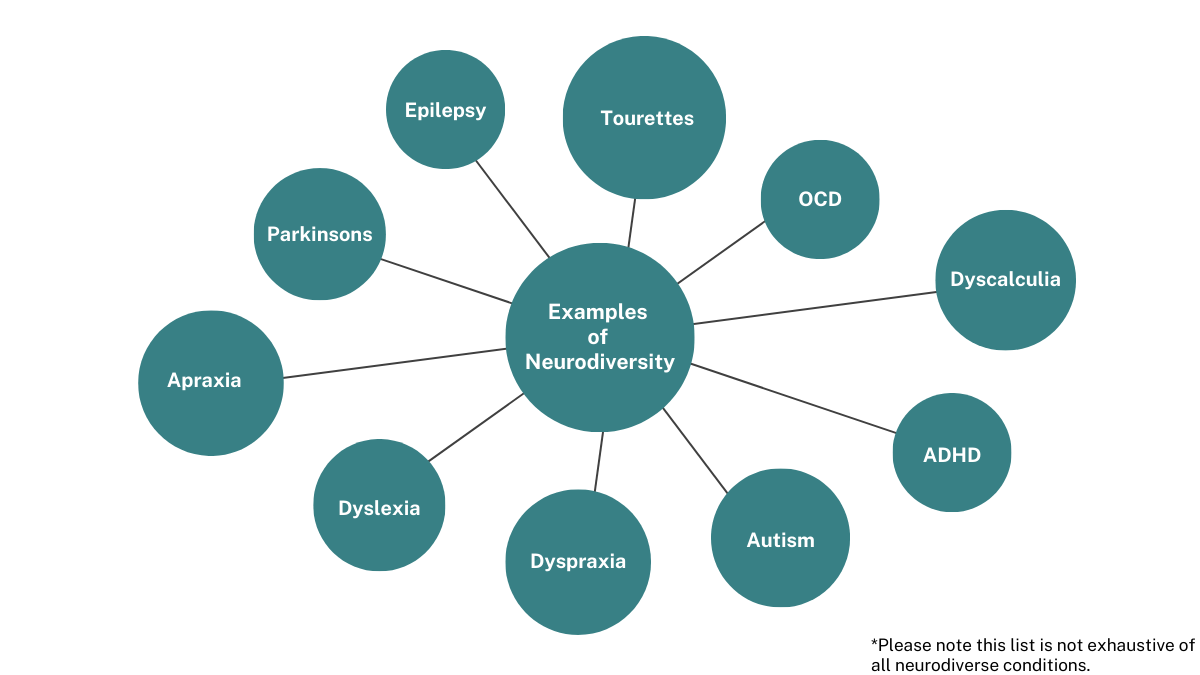Inclusive Hiring: Neurodiversity

Neurodiversity is the natural variation in human brain function and development. It encompasses a wide range of conditions, including but not limited to ADHD/ADD, autism (ASD), dyslexia, Tourette's syndrome, and bipolar disorder. Individuals with neurodivergent conditions have diverse ways of thinking, learning, and communicating. They also bring unique strengths and talents to the workplace, such as innovative thinking, problem-solving skills, creativity, and attention to detail.
Our latest Diversity in Tech report highlighted that neurodiversity emerged as a distinct area of interest amongst businesses, with the number of organisations measuring it doubling to 53% compared to the previous year. These findings indicate a positive shift towards creating more inclusive work environments and a nudge for employers to rethink their hiring practices and embrace the unique talents and strengths neurodivergent individuals bring.
Neurodiversity encompasses a wide range of conditions, including:

Why is being inclusive of neurodiversity important in the workplace?
Neurodiversity is a fact of life in your workforce with an estimated 1 in 4 people being neurodivergent, your workforce is already likely to be neurodiverse. The real question is what are you doing to be inclusive about it? A neuro-inclusive environment fosters a culture where employees of diverse experiences and thinking processes feel comfortable being themselves, resulting in increased productivity and engagement. This offers huge benefits to employers who can leverage the skills of neurodiverse employees to nurture innovation and performance. In fact, GCHQ even put out a blog about how neurodivergent intelligence analysts view their different thinking approaches as mission-critical for protecting the country.
How do businesses benefit from neuroinclusive practices?
Businesses adopting neuroinclusive hiring practices can benefit from:
-
Improved problem-solving. Neurodivergent people can have unique perspectives and approaches to problem-solving. This can help teams develop more innovative and effective solutions to challenges.
-
Enhanced creativity. Neurodivergent people can be highly creative with outside the box thinking. This can be a valuable asset for businesses that are looking to develop new products, services, and ideas.
-
Increased productivity. When neurodivergent employees are enabled to be comfortable and supported in the workplace (as all employees should be), they are more likely to be productive and engaged.
-
Reduced absenteeism. When Neurodivergent employees are given inclusive environments to work in, they are less likely to be absent from work.
-
Improved employee morale. Neuroinclusive practices can create a more inclusive and welcoming work environment for all employees. This can lead to improved employee morale and job satisfaction.
Hiring inclusively for neurodiversity
One of the first ways companies can start looking at neuroinclusive practices is in hiring. Implementing a neuroinclusive interview process has several benefits:
- Fair recruitment opportunities: This helps to level out the playing field, ensuring all candidates have a fair and equal chance to showcase their skills and potential.
-
Wider talent pool: Allows organisations to tap into a wider range of talent and build a more diverse workforce.
-
Inclusive culture for all: It cultivates a more inclusive and welcoming work environment for all employees.
TTC Signatory, Flagstone Group, have shared their neurodiverse hiring checklist for what to do before, during and after an interview to support neurodiverse applicants. You can view it here.
Four interview accommodations for neurodivergent candidates
-
Advance notice of interview questions. This gives the candidates time to prepare and feel more confident in the interview.
-
Flexible interview formats. Allow candidates to choose their preferred interview format: face-to-face, phone or video. Avoid large groups of interviews as candidates may find elements of social interaction challenging.
-
Structured interviews. Clear and straightforward questions can help neurodivergent candidates understand questions and respond accurately. Consider using closed questions focusing on the candidates' skills and experiences rather than open-ended questions that may lead to vague answers or uncertainty.
-
Accommodating environment. Be open to creating a supportive and accommodating environment as required for candidates. For example, consider using dim lighting and avoiding strong smells.
How can organisations support neurodivergent employees in the workplace?
Once you have hired neurodivergent employees, it’s important to ensure your work culture continues to be inclusive of neurodivergence, to enable employees to thrive in their roles.
Supporting neurodivergent employees in the workplace requires employers to be understanding, aware, and adaptable. In addition to making accommodations during the interview process, employers can support neurodivergent employees in the workplace by:
-
Education and awareness. This includes training management and employees about neurodiversity, and celebrating and promoting a culture of inclusiveness, understanding, and acceptance. In particular, there is currently a surge of awareness for women who are receiving diagnosis later in life and creating awareness and comfort around neurodiversity can help them feel supported if this occurs whilst they are in the workforce.
-
Flexible work arrangements. Neurodivergent employees benefit from flexible work arrangements, such as remote work, flexible hours, or breaks as needed. Ensure your policies allow flexibility to enable folks to deliver their best work.
-
Provide tailored workspaces. This could include offering noise-cancelling headphones, partitions, or private rooms, as well as adjustable lighting and clear and organised spaces. This can help with sensory issues that some folks experience as part of their neurotype.
-
Make tasks and projects adaptable. This could involve allowing for task rotation, modifying tasks based on strengths and challenges, or teaming up with employees to complement each other's skills. This enables you to leverage the “spiky skill profiles” that can be a trait of neurodivergence.
It is important to remember that neurodivergent people are just as capable as neurotypical people. The problems they can encounter are sometimes just a reflection of workplaces not being designed with neurodivergence in mind. By taking these steps, employers can create a level playing field and ensure that all candidates have a fair chance to succeed
Want to learn how to make your hiring process more neurodiversity-inclusive? Check out Flagstone's hiring checklist now.